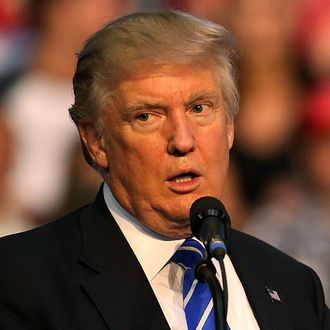
Donald Trump has been reading his Paul Krugman. On Monday, the New York Times columnist argued that the United States should sharply increase public investment — and fund it by taking on more debt while interest rates are low:
Put these two facts together — big needs for public investment, and very low interest rates — and it suggests not just that we should be borrowing to invest, but that this investment might well pay for itself even in purely fiscal terms. How so? Spending more now would mean a bigger economy later, which would mean more tax revenue. This additional revenue would probably be larger than any rise in future interest payments.
And this analysis doesn’t even take into account the potential role of public investment in job creation: Despite a low headline unemployment rate, the U.S. economy is still probably short of full employment, and an investment agenda would also offer valuable insurance against possible future downturns.
Krugman’s analysis is backed by most economists who aren’t being paid by Pete Peterson to generate reasons for abolishing Social Security. But even if one rejected the idea that, at current rates, public investment pays for itself, the case for infrastructure stimulus would still be strong.
When deficit hawks lament the burden we’re leaving to our grandchildren, they ignore the other side of our national balance sheet. After all, our heirs don’t just inherit our debts — they also collect on our assets. And if you refuse to take out a low-interest loan to fix your family home’s leaky roof, you’ll almost certainly end up bestowing less wealth on your grandchildren than if you’d invested in that vital infrastructure. Especially if your “family” is actually a sovereign nation that can print its own money. As former World Bank chief Larry Summers writes:
It is true that an expansionary fiscal policy would increase deficits, and many worry that running larger deficits would place larger burdens on later generations, who will already face the challenges of an aging society. But those future generations will be better off owing lots of money in long-term bonds at low rates in a currency they can print than they would be inheriting a vast deferred maintenance liability.
So: The economic analysis in Krugman’s column is rock-solid. The political analysis, however, is a bit more suspect. Krugman suggests that the only obstacle to a hefty infrastructure stimulus is the recalcitrance of House Republicans, writing, “it matters not just who wins in November, but by how much. Will there be a strong enough Democratic wave to give Mrs. Clinton the ability to act?”
It’s true that Paul Ryan’s caucus will fiercely oppose anything that smells like good public policy. But, in his column, Krugman ignores that, in the 2016 presidential race, Clinton is the one running as a deficit hawk.
The Democratic nominee is campaigning on a plan to spend $275 billion on rebuilding our infrastructure. The Krugmans of the world believe a much larger investment is warranted — as do the Donald Trumps.
“Well, you need a lot more than that to do it right,” Trump said of Clinton’s plan on CNBC Thursday morning. He had previously pledged to spend at least twice as much as Clinton on rebuilding our roads and bridges. And unlike Clinton, who wants to fully fund her modest stimulus, Trump is comfortable taking out loans to pursue a more ambitious program.
“The interest rates are so low, I mean, the numbers are so low, that, yes, this is a time to borrow and borrow long-term,” Trump continued. “So that we have the money [to] rebuild our infrastructure.”
Clinton has attacked Trump for proposing an agenda that isn’t deficit neutral, saying, “He can’t escape the math … I have pointed to what my plans are, what I think will help more people and how we will pay for them.”
From a political standpoint, Clinton’s decision to play deficit scold is understandable. After all, Trump’s full fiscal agenda is genuinely irresponsible: The mogul doesn’t just want to borrow money to finance important public investments; he also wants to take on debt so the one percent can get a huge tax break (and so his children’s inheritance can go untaxed). What’s more, the American people have long been conditioned to be afraid of deficits, and the GOP has worked for decades to tar Democrats as spendthrifts.
But with her Republican rival proposing a stimulus of up to $1 trillion — and trailing her by double digits in national polls — Hillary Clinton has plenty of political cover to put forward a more ambitious infrastructure plan. (In fact, even if $275 billion were her ideal number, it would be in her interest to run on a higher one, since compromising with congressional Republicans would likely mean embracing a smaller figure.) The fact that she hasn’t adopted a more expensive infrastructure agenda suggests that she’s genuinely more averse to deficit spending than Paul Krugman, Larry Summers, or Donald Trump.
Which means that, should Clinton win in November, Krugman may find that the call for fiscal prudence is coming from inside the White House.






























